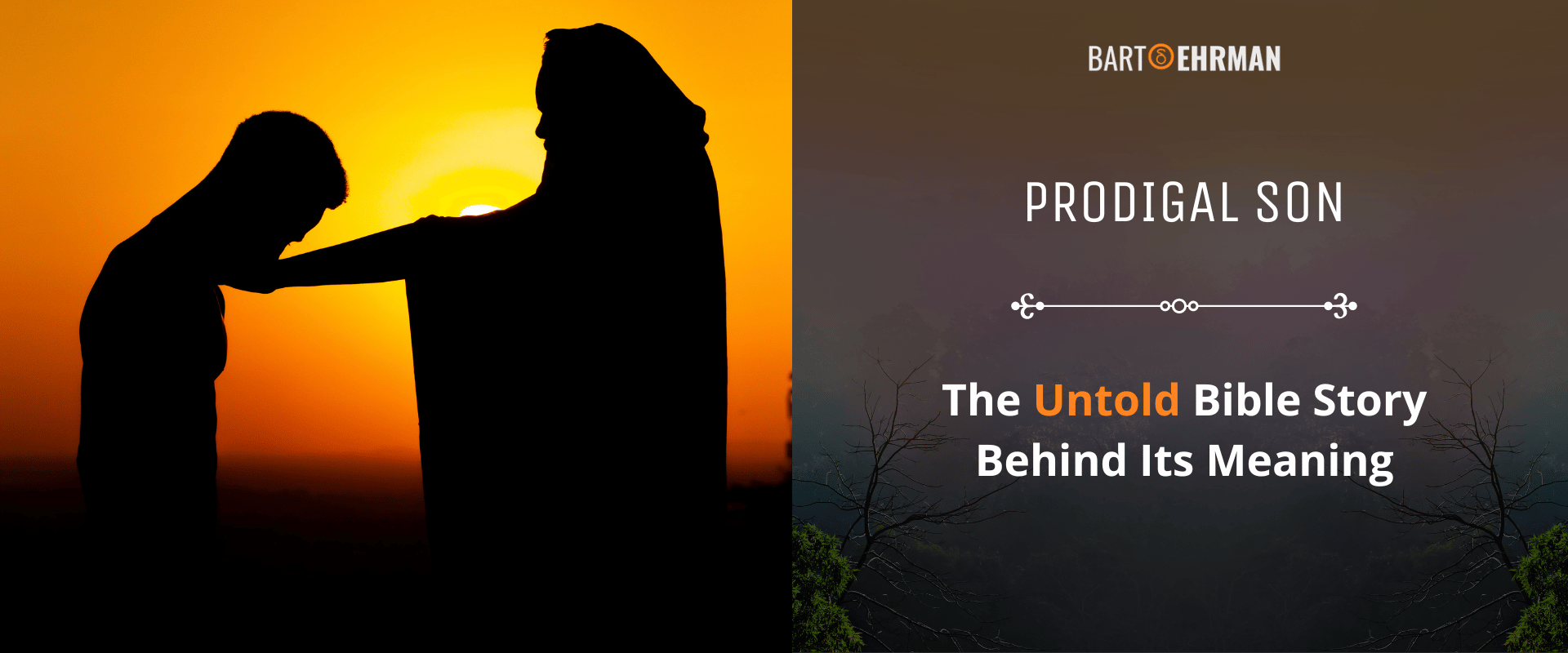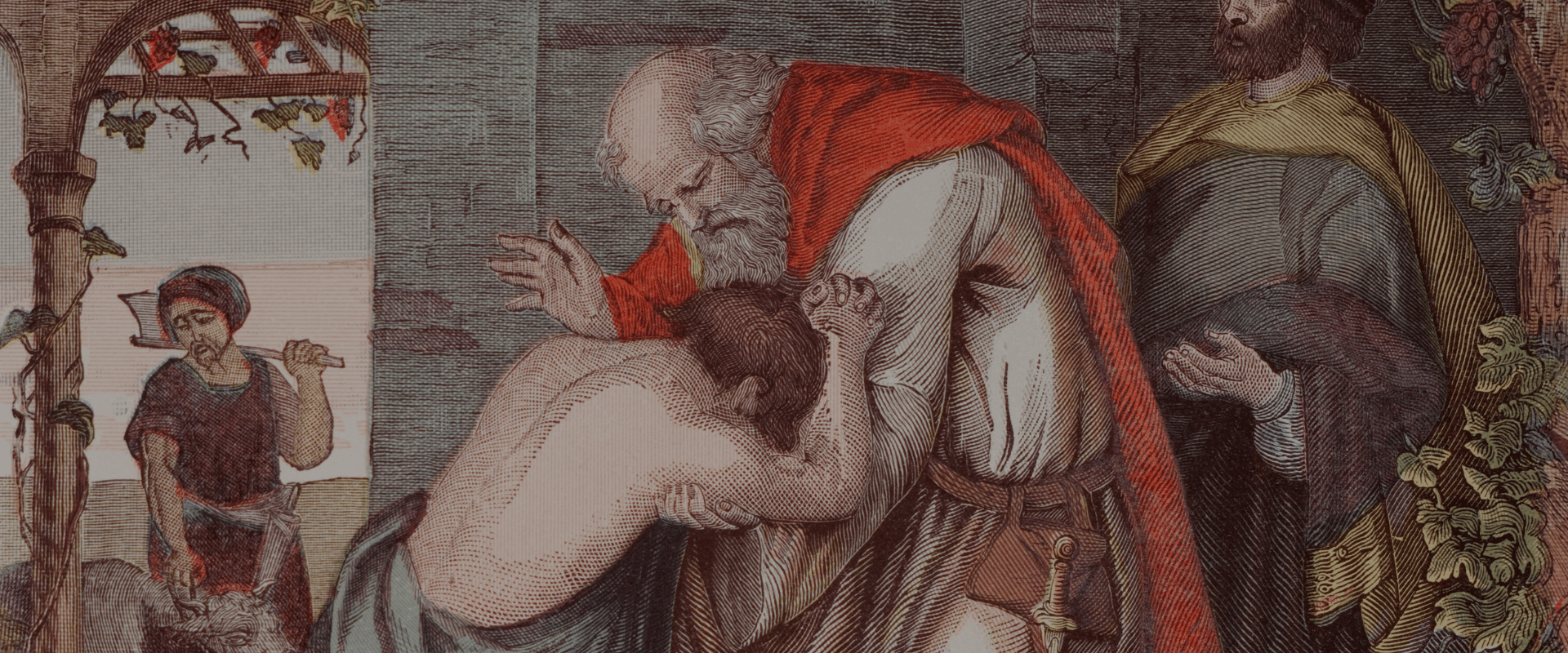Prodigal Son: The Untold Bible Story Behind Its Meaning

Written by Marko Marina, Ph.D.
Author | Historian | BE Contributor
Verified! See our guidelines
Verified! See our editorial guidelines
Date written: May 28th, 2024
Disclaimer: The views and opinions expressed in this article belong to the author and do not necessarily match my own. - Dr. Bart D. Ehrman
The phrase “prodigal son” often appears in modern conversations, evoking powerful images of redemption and return from a wayward path, yet its rich scriptural origins are frequently overlooked. Its widespread application has imbued the term “prodigal son” with various meanings and significant relevance in common English usage.
However, this widespread use has overshadowed the original, complex narrative rooted in early Christianity and the teachings of Jesus, an apocalyptic prophet.
But what is the story behind this powerful phrase? For many, the term might conjure a general sense of return, yet the layers and nuances of the "prodigal son" as depicted in the Gospel of Luke offer a much deeper narrative.
This article promises not only to explore the familiar phrase but to explore the Biblical story that has left an indelible mark on culture and language. Our exploration will be thorough and scholarly, aiming to illuminate this tale in a manner that is both objective and accessible, regardless of one's prior knowledge of Christianity’s origins.
As we unpack the narrative and its subsequent influence on language and culture, we invite readers to join us on a journey of discovery. The story of the prodigal son isn’t just a tale of personal redemption; it’s a cultural touchstone that reveals a social setting and key thematic emphasis of the author who penned the Gospel of Luke.

The Gripping Bible Story Behind “The Prodigal Son”
In the Gospels, Jesus’ teachings often unfold through parables that can be defined as simple stories used to illustrate moral or religious lessons. We’ve already delved into Jesus’ parables from the eye-bird perspective in a recent article that you can visit here.
Among these, the Parable of the Prodigal Son stands out, not only for its depth but also for its resonance across cultures and generations. As it turns out, the commonly used phrase derives from the story detailed in Lk 15:11-32.
The narrative begins with a young man, often referred to as the prodigal son, who demands his share of his father's estate - an audacious request that implies a wish for the father’s death. With his inheritance in hand, the young man journeys to a foreign land, where he squanders his fortune on reckless living.
Destitute and despairing, he finds himself feeding pigs - a task considered unclean and humiliating in the Jewish community of its time. So profound was his hunger that he longed to eat the scraps meant for pigs. Quite a disturbing place to be, isn’t it? At this lowest point, he reflects on the abundance of his father’s servants who live far better than he does!
Resolved to return home, the prodigal son rehearses a plea for forgiveness. He is hoping to work as a servant in the house he fled years ago. However, as he approaches, his father sees him from afar and runs to greet him—not with scorn, but with a warm embrace and tears of joy.
The father immediately orders his servants to prepare a grand feast to celebrate his son's return. The son, who was (as a famous song goes) “once lost” is “now found” and restored to his place in the family.
Since every good story needs an opposite character, the prodigal son in the Bible has a brother - a good son, who has remained at home helping his father as the son should. But the older son can’t fathom why his father would celebrate the return of his reckless son when he, the faithful son, has never received such recognition.
The father’s response to this protest reveals a deeper issue at hand: “Son, you are always with me, and all that is mine is yours. But we had to celebrate and be glad because this brother of yours was dead and is alive again; he was lost and is found.”
By uttering these words, the author of Luke’s Gospel wants to emphasize that the Father’s love is abundant and inclusive - it extends grace and forgiveness where it’s least expected.
The “Prodigal Son” in Everyday Language and Culture
What is a prodigal son? Merriam-Webster defines it as "a son/daughter who leaves his or her parents to do things that they don't approve of but then feels sorry and returns home." This concise definition captures the essence of the Biblical story, yet the phrase has transcended its scriptural origins to become a staple in modern vernacular.
This phrase has woven itself into the fabric of contemporary Western culture as a symbol of redemption and the return to one’s beginnings after a period of error or misadventure.
This cultural adaptation is perhaps best exemplified by the recent TV series titled "Prodigal Son." The show revolves around a former FBI profiler who now assists the NYPD in solving crimes and views his work as a form of penance for the sins of his father.
Here, the "prodigal" isn’t only returning to a physical location but is also seeking a moral and emotional return to a life less burdened by his past.
Furthermore, the term "prodigal son" echoes through English literature which makes it more than a mere biblical reference. He often appears as a motif for characters who embody the struggles of departure and return thus representing a journey of personal growth and self-discovery.
In Charles Dickens' "Great Expectations", for example, Pip is a reflection of the prodigal son's journey through his squandered wealth and his eventual humble return.
Similarly, in Thomas Hardy's "The Return of the Native" and Evelyn Waugh's "Brideshead Revisited", Clym Yeobright and Lord Sebastian Flyte respectively are portrayed as characters who are confronted with the harsh realities of their return thus recreating the prodigal son's journey.
This literary device enriches narratives by providing a relatable path of redemption that audiences can empathize with, further cementing the phrase in the lexicon of English expression.
Needless to say, the widespread popularity of the "prodigal son" phrase is largely a consequence of the triumph of Christianity. Had the religion centered around Jesus remained a minor sect within Judaism, it’s unlikely that this phrase would have left such a significant imprint on contemporary culture.
But what is the original meaning of the "Parable of the Prodigal Son"? This tale is uniquely found in the Gospel of Luke which prompts us to consider what the author intended to convey through this narrative. In other words, what message was Luke aiming to highlight?
As we turn to contemporary scholarly interpretations, let’s explore these questions in greater depth to understand the historical significance of this parable.
FREE COURSE!
WHY I AM NOT A CHRISTIAN
Raw, honest, and enlightening. Bart's story of why he deconverted from the Christian faith.
Over 6,000 enrolled!
The Meaning of the Prodigal Son's Parable in Luke’s Gospel
When I teach my students about the New Testament Gospels, I emphasize the importance of understanding that each Gospel writer approached the story of Jesus from a unique perspective which was shaped by their individual theological and social contexts.
This is particularly evident in the Gospel of Luke, where the narrative is shaped not just by recounting events but by conveying deeper theological meanings. To fully grasp the significance of the Parable of the Prodigal Son, therefore, we must delve into Luke’s thematic approach without conflating it with the narratives found in other gospels.
One of Luke’s central themes is the idea that Jesus came to seek out and save the lost. This theme is vividly illustrated in the Parable of the Prodigal Son, where forgiveness is extended not just to ordinary sinners but to those who appear to be irredeemably lost from the religious community.
In other words, this parable underscores a broader, more inclusive understanding of salvation, suggesting that Jesus' ministry was about reconciling the most marginalized individuals back into the fold of God’s love.
Moreover, Luke also presents an apocalyptic picture of Jesus who preaches the coming of the Kingdom of God. In contrast to Mark’s Gospel, Luke does dial it down a notch but the apocalyptic element of Jesus’ portrayal is still there.
In this light, Arnald J. Hultgreen's observation becomes particularly useful. He notes that this parable is a way for Luke to "depict the ministry of Jesus as the inauguration of the Kingdom of God, a God whose love surpasses all typical expressions known to humanity... The parable portrays the love of God in such a way that it evokes resentment in those who assume that they know all there is to know about it."
Similarly, Joseph Fitzmyer notes that the parable “presents the loving father as a symbol of God himself. His ready, unconditioned, and unstinted love and mercy are manifested not only toward the repentant sinner (the younger son) but toward the uncomprehending critic of such a human being. The parable portrays the message of Jesus, the kingdom preacher, especially with the Lucan stress on the divine willingness to accept the repentant sinner into that kingdom.”
The Parable of the Prodigal Son, therefore, isn’t merely a story of familial reunion but a powerful allegory of divine love and forgiveness that resonates deeply with Luke's portrayal of Jesus' mission. It challenges prevailing religious attitudes and invites believers to reconsider their understanding of God's love and salvation.
Having journeyed through Luke’s topics and themes, let’s go back even further and ask the basic historical question: Did Jesus teach this parable or should we interpret it as a product of a post-Eastern Church? To put it more bluntly: Does this parable derive from the historical Jesus or the “Christ of faith”?

The Parable of the Prodigal Son: Historical Authenticity?
Since the 18th century, the critical study of the New Testament Gospels has evolved significantly. Historians and scholars have recognized that these texts, written decades after Jesus' death by authors who didn’t know him personally, can’t be taken at face value.
These narratives primarily reflect the beliefs and practices of early Christian communities rather than providing direct accounts of Jesus' life. As a result, the Gospels are seen first as documents that illuminate the concerns and contexts of these communities in the late 1st century.
Only with caution and scholarly analysis do they serve as sources for understanding the historical Jesus.
In an attempt to identify the historical Jesus from the textual traditions, scholars have developed various criteria over the 20th century to assess the probability that he actually spoke certain teachings attributed to Jesus.
These methodologies are crucial for those studying the Gospels not just as religious texts but as historical documents. For readers interested in a deeper dive into these criteria, further exploration can be found in our previous articles (here and here). And if you want to test your knowledge about the historical Jesus, take our excellent quiz - it’s free!
This approach brings us to the Parable of the Prodigal Son. The question of whether the historical Jesus taught this story or was a product of later Christian reflection has been debated extensively.
Perhaps the first question to tackle in this endeavor is a rather obvious one. Why does the parable only appear in Luke? And does that diminish its likelihood of being authentic?
As noted in our earlier article, the Synoptic Gospels (Mark, Matthew, and Luke) exhibit significant literary interdependence. Most scholars explain it through the Four-document hypothesis. This theory posits that the Gospels of Matthew and Luke drew from four sources: the Gospel of Mark, the hypothetical Q source (a collection of Jesus' sayings), and unique material specific to each Gospel known as the “M” and “L”.
The parable of the Prodigal Son is preserved only in Luke’s Gospel which suggests that the author derived it from the "L" source. This indicates that the narrative was part of Luke's unique tradition that probably originated from the stories about Jesus circulating across the early Christian communities.
So, what do scholars think about its historical authenticity? Interestingly, even the Jesus Seminar, known for its rigorous and often highly skeptical standards, concluded that this parable likely originated with Jesus himself.
They conclude: “The parables and aphorisms form the bedrock of the tradition. They represent the point of view of Jesus himself. Jesus did not tell stories about what he did; he isn’t the subject of his discourse. When he told stories, he talked about prodigal sons, lost sheep, travelers who had been mugged, and similar events in his everyday world.”
This consensus is supported by other scholars such as E.P. Sanders who believes that this parable highlights Jesus’ theme of radical forgiveness and reversal of societal values in the coming Kingdom of God.
Referring to this parable, he notes: “Jesus' audience would have stressed the duty of a child to parent more than we would and would have seen these three relationships as being closer to one another than most of us think today. Nevertheless, the ancient world knew about parental leniency, and comparing God to an extremely indulgent parent was doubtless very effective in Jesus' day. That is, the audience got the point.”
Furthermore, Gerd Theissen and Annette Merz argue for the authenticity of the parable’s themes within a Jewish context thus reinforcing the notion it was unlikely to have been an invention of the evangelist or his community.
They observe: “The plausibility of both context and impact thus suggest that the parables derive from the historical Jesus: they can be derived from Jewish tradition but have an individual stamp in their present context. Primitive Christianity soon went over to other forms of figurative discourse.”
They particularly highlight the Jewish elements in the Parable of the Prodigal Son, concluding, “It’s improbable that the evangelist composed such parables with a Jewish perspective.”
Summing up Conclusion
This article has delved into the profound layers of the "Prodigal Son" phrase and parable, exploring its significance from multiple perspectives. We have traced the evolution of the term from its scriptural roots in the Gospel of Luke to its broad adoption in contemporary language and culture.
In examining the story's original context, we explored how Luke’s themes of forgiveness and inclusivity reflect a deeper theological message thus emphasizing a God whose love is boundless and extends grace even to those seemingly beyond redemption.
Finally, we addressed the historical authenticity of the Parable of the Prodigal Son, engaging with scholarly debates to assess whether this teaching could indeed be attributed to Jesus himself.
By applying modern critical methodologies, scholars like E.P. Sanders and the collective insights from the Jesus Seminar support the view that this parable likely originated from the historical Jesus.
The origins of Christianity are full of interesting endeavors and questions, particularly regarding the historical reliability of the Gospels. To explore whether these accounts can be corroborated or if they are based on myth and legend, consider enrolling in "The Unknown Gospels" by Dr. Bart D. Ehrman. This online course offers an in-depth examination of these texts, guided by one of the foremost scholars in the field.

